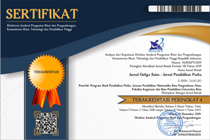THE IMPLEMENTATION OF GENERATE ARGUMENT INSTRUCTION MODEL ON OPTICAL MATERIAL TO IMPROVE STUDENTS ARGUMENTATION SKILLS IN SMP 20 PEKANBARU GRADE VIII
Abstract
Scientific argumentation is one of the thinking ability which important to be trained in order to make students not only focus on solving quantitative problem and analyze physics phenomena in daily life. This study was aimed to determine the effect of Generate Argument Instruction model toward student argumentation skills on optical material. Quasy experiment was use as study model by using intact group comparison. The population in this study were students grade VIII of SMPN 20 Pekanbaru which consisted of seven classes. Two classes whas choossen to be experiment and control class based on normality and homogenity test. The data was analyze by using descriptive and inferential statistic techniques. The result of this study showed there was a sifnificant influence toward students argumentation skill between experiment class that using implementy Generate Argument Instructional Model and control class that using conventional learning. The argumentation skill of experimental class was higher than class control (12,7%). It can be conclude, the generate argument instructional model gave the positive effect toward student’s argumentation skills.
Keywords
Full Text:
PDFReferences
Cho, K.L., & Jonassen, D.H., 2002. The Effects of Argumentation Scaffolds on Argumentation and Problem Solving. ETR&D, 50 (3), 5-22.
Christenson, N., Rundgren, S.N.C., & Zeidler, D.L., 2014. The relationship of discipline backgorund to upper secondary student’s argumentation on socioscientific issues. Research in Science Education, Published online.
Christenson, N., Rundgren, S. N. C., & Hoglund, H.O., 2012. Using the see-sep model to analyze upper secondary students’ use of supporting reason in arguing socioscientific issues. Journal Science Education Technology, 21, pp. 342-352.
Dahar, R. W., 2011. Teori-Teori Belajar dan Pembelajaran. Penerbit Erlangga. Jakarta.
Erduran, S., Simon, S., & Osborne, J., 2004. Taping into Argumentation: Developments in the Application of Toulmin’s Argument Pattern for Studying Science Discourse. Journal Science Education, 88 (6), 915-933.
Foong, C.C., Daniel, & Ester G.S., 2013. Student’s Argumentation Skills Across Two Socio-Scientific Issues in a Confucian Classroom: is Transfer Possible?. International Journal of Science Education, 35 (14), 2331-2355.
Ginanjar, W.S. 2014. Penerapan Model Argument-Driven Inquiry untuk Meningkatkan Kemampuan Argumentasi Ilmiah Siswa SMP. (Skripsi). Universitas Pendidikan Indonesia, Bandung.
Mulyasa, E., 2014. Pengembangan dan Implementasi Kurikulum 2013. Remaja Rosdakarya, Bandung.
Osborne, J., Erduran, S., & Simon S., 2002. Enchancing The Quality of Argumentation in School Science. Journal of Research in science teaching, 41(10), 994-1020.
Sampson, V. & Grooms, J. 2010. Promoting and Supporting Scientific Argumentation Outside the lab: Generate an Argument Instructional Model. The Science Teacher, pp. 32-37.
Sasmita, Juwansyah., 2014. Efektivitas Model Pembelajaran Pembangkit Argumen Menggunakan Metode Investigasi Sains untuk Meningkatkan Kemampuan Argumentasi Siswa SMP. Skripsi. tidak di publikasikan. Universitas Pendidikan Indoonesia, Bandung.
Sugiyono, 2013. Metode Penelitian Kuantitatif Kualitatif dan R&D. Pustaka Setia. Bandung.
Venville, G.J. & Dawson, V.M., 2010. Teaching Strategies for Developing Students’ Argumentation Skills About Socio-scientific Issues in High School Genetics. Research in Science Education, 42, pp. 133-148.
Von Aufschnaiter, C., 2008. Arguing to learn and learning to argue : Case studiesof how students’ argumentation relates to their scientific knowledge. Journal of Research in Science Teaching, 45(1), pp. 101-131.
Walker, J. Phelps, 2011. Argumentation in Undergraduate Chemistry.Laboratories. Disertasi. Florida State University Libraries.
DOI: http://dx.doi.org/10.31258/jgs.6.1.19-25
Refbacks
- There are currently no refbacks.
Copyright (c) 2018 Armila Jayanti, M. Nor, M. Rahmad

This work is licensed under a Creative Commons Attribution 4.0 International License.
Jurnal ini terdaftar dan terindeks pada:
- Crossref
- Google Scholar
- Crossref
- Garuda
- Sinta
- Researchgate
- Dimensions
- Base
- Scilit
- OneSearch
- Road
- CiteFactor
- ResearchBib
- WorldCat



















